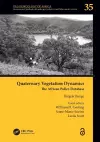
Quaternary Vegetation Dynamics
4 contributors - Hardback
£89.99
Jürgen Runge is a Professor of Physical Geography and Geoecology at the Goethe-University Frankfurt, Germany. He is the director of the Centre for Interdisciplinary African Studies (ZIAF). As an environmentalist and consultant, he has worked for many years in West and Central Africa on the evolution of tropical landscapes, former and recent climate changes. He is the editor of the series "Palaeoecology of Africa" and a member in several scientific editorial boards. The outcome of his studies has been used for regional planning (land use, infrastructure, management of natural resources). From 2007-2010 he was working for the German International Cooperation (GIZ) leading a subregional project on geological resources, transparency and good governance in Africa. Currently, he is involved in capacity development measures such as international summer schools and training workshops.
William D. Gosling is an Associate Professor in Palaeoecology at the University of Amsterdam and Head of the Department of Ecosystem & Landscape Dynamics. Throughout his research and education William seeks to place current concerns related to on-going, and projected, climate change into a long-term context by examining multiple aspects of the sedimentary record of past environmental change. He is an expert in tropical pollen and environmental change during the Quaternary (last 2.6 million years). He seeks to gain insights into past ecosystem function through combining regional vegetation histories generated from pollen records obtained from sedimentary archives with other lines of evidence, including: ancient charcoal (fire history), phytoliths (local vegetation change), and organic geochemistry (plant response to environmental change). William has been working on African projects since 2007 when he was invited to join the team investigating the sedimentary core recovered from Lake Bosumtwi (Ghana). Unravelling the complex pollen record from Bosumwti lead William to spend time working with one of the pioneers of palaeoecology in Africa, the late Prof. Daniel Livingstone, and to establishing a modern pollen trapping program across the forest-savannah vegetation gradient in West Africa.
Anne-Marie Lézine is senior scientist at the French National Centre for Scientific Research in Paris. As a specialist in past vegetation dynamics and climate reconstructions from pollen and hydrological data she has a about 40-years of experience in tropical Africa and surrounding regions. Trained in Marseille (France) where she got her PhD in 1987, she initially studied the Holocene environments of Ethiopia. Then she focused her research on arid (deserts from the Sahara (Mauritania, Algeria, Chad) and the Rub al Khali (Yemen, Oman)) and semi-arid regions (Senegal). Since 2007, she has been moving towards the Equator. Her studies include the 90,000 years long pollen record of Lake Bambili, and other lake deposits from the Cameroon highlands. Her studies have been used for biome, land cover and climate reconstructions. Apart from her scientific skill, Anne-Marie is the coordinator of the African Pollen Database since its early beginning in 1994.
Louis Scott is a researcher and mentor at the Department of Plant Sciences at the University of the Free State, Bloemfontein, South Africa. Following initial research on Cretaceous pollen and spores, he graduated in 1979 under E. M. van Zinderen Bakker and J. A. Coetzee, previous editors of PoA, with a PhD in Botany at the University of the Free State with a dissertation on late Quaternary fossil pollen from thermal spring and swamp deposits from the Limpopo and Gauteng provinces, South Africa. Following an early sabbatical in Tucson, at the University of Arizona, and a research visit to Marion Island, Southern Ocean, he continued to study Quaternary and older palaeoenvironments in South Africa, Namibia and Botswana. His studies include long pollen records from the Tswaing Crater lake, hominid and other cave deposits, hyena coprolites and fossil hyrax dung middens.